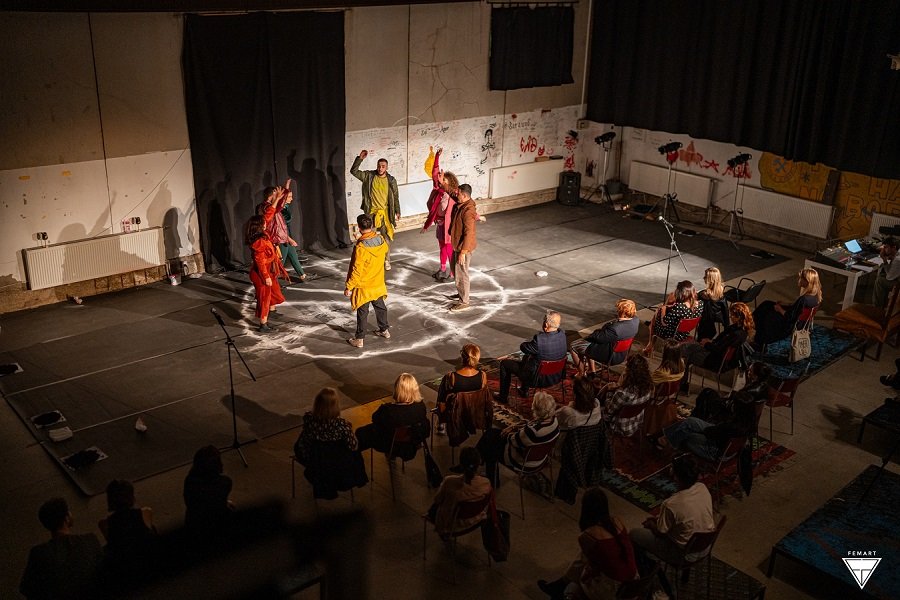By: Gili Hoxhaj
In ‘’I want a Country’’ theater play, the characters struggle with uncertainty, feeling discontented in the environments they inhabit. They are caught between their homeland, a new land, and a surreal space. The play, written by Greek author Andreas Flourakis and directed by Ema Andrea, was showcased on the third night of the FemArt festival at “Termokiss” in Pristina. The audience found themselves face-to-face with the actors, immersed in their world of survival, navigating complex situations. The actors, dressed simply, depicted the struggles of ordinary people—those who are strangers both in their homeland and the new country they’ve come to. Their frustrations collide in heated words, forming a series of questions left unanswered—personal stories lost in the chaos of collective desires.
This play was first performed earlier this year at the National Experimental Theater “Kujtim Spahivgoli” in Tirana. The cast included Adriana Tolka, Matia Llupa, Paolo Kadillari, Artemis Beluli, Eva Gjika, Eraldo Malaj, and Lindar Kaja. Director Ema Andrea has shared that this performance is her contribution to sparking societal reflection and bringing people closer to the beautiful. “We are heading toward a time when things come easily, and people are afraid to take responsibility,” she said.
The characters are in a place that has no space for children or the elderly. They dream of an island in the Atlantic, a place where children can hear their native language and ask, “What language are they speaking?” Amidst constant movement, they search for an escape from the gloom and chaos that surrounds them. The ship they’re on is ready, yet uncertain. They long for a place that suits all continents—a place that won’t disappoint them. They dream of a place without deadly diseases, where they can sleep in peace. But they seek a new map. Yet, no new place comes without the weight of the old one’s problems—problems that follow them or resurface in their new surroundings. Adriana Tolka offered her interpretation of the play’s message.
“This is a poetic play that focuses on immigration—the desire to find new spaces to grow, to seek freedom—but not always finding that far from one’s homeland. Sometimes, it’s better to stay where you are,” said actress Adriana Tolka. The play doesn’t offer a clear ending, leaving space for the audience to find their own meaning. According to Tolka, the performance requires both physical and psychological commitment, and as a team, the actors must constantly strive to keep up the rhythm.
“Like all art, it doesn’t give a solution but instead guides us, and everyone finds their own answer. This play is especially difficult because it’s very physical. It demands sensitivity, which is another challenging aspect. Physical attention and focus need to be at their peak,” she explained. The performance is built on movement, sensations, and the search for new emotions. This is how assistant director Sinan Lila described it. “The text remains Balkan, but the way the director and actress have brought it to life is a blend of both worlds. The inspiration has come from both sides. We were excited to bring it to FemArt because this play touches on more than just immigration. It’s about the search for a new place, but also the search for new emotions, for peace with oneself,” he said. This year’s 12th edition of the FemArt International Festival of Female Artists and Activists, with 30 activities, has embraced the themes of empathy, compassion, and understanding. It hopes to heal the wounds of the past and pave the way for a fairer and more peaceful future. FemArt is breaking down national borders, making us realize that our concerns are the same. However, how we express our inner struggles and efforts for change is what makes all the difference.

